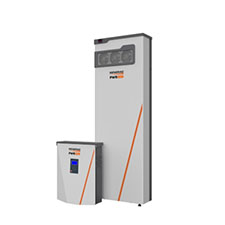
Solar-Plus-Batteries Turning Into an Energetic Combination
Chuck Ross
Rooftop solar panels, once a bit of an oddity, are becoming a common addition to homes across the United States. In 2020, the U.S. Energy Information Administration’s residential energy consumption survey found that almost 4% of U.S. single-family homes were using panels to generate electricity and the market has continued to grow since then, with capacity climbing by 34% in 2021 and an additional 40% in 2022.
In fact, in some states like California regulators are beginning to dial back incentives on panels because home systems are generating more power than they can use during the sunniest part of the day. Instead, to help ensure solar power is available when it’s needed, planners are beginning to encourage residents to add batteries to their homes’ solar systems. The IRS is also supporting greater battery adoption by including the equipment in its rules allowing 30% tax credits for rooftop panels.
Batteries can help build new flexibility into utilities’ distribution systems in a number of ways – and battery owners can see financial benefits that can help provide a better return on investment. In some states, including Massachusetts and Texas, regulators are allowing third-party companies to aggregate the capacity of participating customers’ batteries and sell that power to local utilities during high-demand periods. These “virtual power plant” arrangements can help lead to lower greenhouse gas emissions by limiting the need to fire up natural gas or coal plants when electricity supplies are running thin.
And, of course, pairing a battery system with solar panels also allows you to become your own utility during electricity outages. As with natural gas or diesel generators, a battery system might not be big enough to keep everything in your home running all at once. This means you might not be able to run the dishwasher and dryer when the power is out, but at least you can ensure the refrigerator and HVAC system keeps running, the light’s stay on and internet connections stay active – so, you’ll still be able to Netflix and chill in comfort.
In fact, in some states like California regulators are beginning to dial back incentives on panels because home systems are generating more power than they can use during the sunniest part of the day. Instead, to help ensure solar power is available when it’s needed, planners are beginning to encourage residents to add batteries to their homes’ solar systems. The IRS is also supporting greater battery adoption by including the equipment in its rules allowing 30% tax credits for rooftop panels.
Batteries can help build new flexibility into utilities’ distribution systems in a number of ways – and battery owners can see financial benefits that can help provide a better return on investment. In some states, including Massachusetts and Texas, regulators are allowing third-party companies to aggregate the capacity of participating customers’ batteries and sell that power to local utilities during high-demand periods. These “virtual power plant” arrangements can help lead to lower greenhouse gas emissions by limiting the need to fire up natural gas or coal plants when electricity supplies are running thin.
And, of course, pairing a battery system with solar panels also allows you to become your own utility during electricity outages. As with natural gas or diesel generators, a battery system might not be big enough to keep everything in your home running all at once. This means you might not be able to run the dishwasher and dryer when the power is out, but at least you can ensure the refrigerator and HVAC system keeps running, the light’s stay on and internet connections stay active – so, you’ll still be able to Netflix and chill in comfort.
Photo courtesy of Generac



